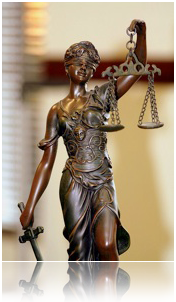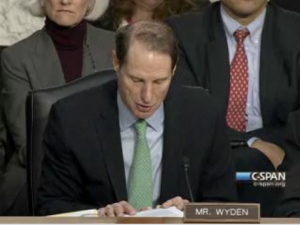Good news! The Fourth Amendment is not totally dead yet!
SCOTUS just handed down its decision in US v. Jones, which I wrote about here. And while there are three concurring opinions (the majority authored by Scalia and joined by Roberts, Kennedy, Thomas, and Sotomayor, a concurrence from Sotomayor, and another concurrence written by Alito and joined by Ginsburg, Breyer, and Kagan), all upheld the Circuit Court decision throwing out evidence warrantless use of a GPS surveillance.
But the opinions are worth reading closely because–as I pointed out in my earlier post–they may indicate whether SCOTUS would find the Administration’s secret use of the PATRIOT Act to track people via the GPS in their cell phones to be legal (as well as other digital surveillance).
Scalia’s opinion focused on the way the government occupied property in this case, arguing that more recent decisions that have focused on reasonable expectations of privacy do not affect the original protection of the Fourth Amendment tied to property.
It is important to be clear about what occurred in this case: The Government physically occupied private property for the purpose of obtaining information. We have no doubt that such a physical intrusion would have been considered a “search” within the meaning of the Fourth Amendment when it was adopted.
[snip]
Jones’s Fourth Amendment rights do not rise or fall with the Katz formulation [expectation of privacy]. At bottom, we must “assur[e] preservation of that degree of privacy against government that existed when the Fourth Amendment was adopted.” Kyllo, supra, at 34. As explained, for most of our history the Fourth Amendment was understood to embody a particular concern for government trespass upon the areas (“persons, houses, papers, and effects”) it enumerates.
[snip]
What we apply is an 18th-century guarantee against un- reasonable searches, which we believe must provide at a minimum the degree of protection it afforded when it was adopted. The concurrence does not share that belief. It would apply exclusively Katz’s reasonable-expectation of-
privacy test, even when that eliminates rights that previously existed.
Alito’s concurrence, on the other hand, sees four problems with this approach, which boil down to the implications of Scalia’s logic being both too narrow and too broad. The first three are:
- It would find non-trespassing long-term surveillance okay but short term trespass not (both one and two are versions of this)
- Given different state property laws (particularly community property under marriage), it would have inconsistent results in different states
Alito’s fourth problem, though, is the key one: Scalia’s approach is not very helpful given how much surveillance is electronic.
Fourth, the Court’s reliance on the law of trespass will present particularly vexing problems in cases involving surveillance that is carried out by making electronic, as opposed to physical, contact with the item to be tracked. For example, suppose that the officers in the present case had followed respondent by surreptitiously activating a stolen vehicle detection system that came with the car when it was purchased.
That said, having made a case that electronic surveillance can be just as inappropriate as physical trespass assisted surveillance, Alito goes onto make problematic squishy distinctions, suggesting our current expectations of privacy with regards to GPS tracking pivot on the length of time the surveillance continues. And he suggests we may be losing our expectation of privacy with respect to that tracking.
For example, when a user activates the GPS on such a phone, a provider is able to monitor the phone’s location and speed of movement and can then report back real-time traffic conditions after combining (“crowdsourcing”)
the speed of all such phones on any particular road.9 Similarly, phone-location-tracking services are offered as “social” tools, allowing consumers to find (or to avoid) others who enroll in these services. The availability and use of these and other new devices will continue to shape the average person’s expectations about the privacy of his or her daily movements.
Most troubling, Alito suggests that for some “extraordinary offenses,” extended tracking might be okay.
We also need not consider whether prolonged GPS monitoring in the context of investigations involving extraordinary offenses would similarly intrude on a constitutionally protected sphere of privacy. In such cases, long-term tracking might have been mounted using previously available techniques.
Both Alito and Scalia (who rightly mocks this carve out) seem unwilling to talk about what might be acceptable in counterterrorism surveillance.
In short, while Scalia crafts a fairly cautious opinion based on private property, Alito crafts one that could easily be chipped away as we all get used to our smart phones.
The two arch-conservative Republicans both defend the Fourth Amendment, though, but it’s unclear they’re read to talk about the big questions before us (and, presumably, before them in the near future). In at least one way, Alito even underestimates what the government is capable of, claiming it cannot
But the use of longer term GPS monitoring in investigations of most offenses impinges on expectations of privacy. For such offenses, society’s expectation has been that law enforcement agents and others would not—and indeed, in the main, simply could not—secretly monitor and catalogue
every single movement of an individual’s car for a very long period.
That’s likely a false assumption, particularly given the storage capacity our government is using to surveil us and the requirements on cell phone companies to store data.
Sotomayor, IMO, is the only one ready to articulate where all this is heading. She makes it clear that she sides with those that see a problem with electronic surveillance too.
I would take these attributes of GPS monitoring into account when considering the existence of a reasonable societal expectation of privacy in the sum of one’s public movements. I would ask whether people reasonably expect that their movements will be recorded and aggregated in a manner that enables the Government to ascertain, more or less at will, their political and religious beliefs, sexual habits, and so on.
[snip]
I would also consider the appropriateness of entrusting to the, in the absence of any oversight from a coordinate branch, a tool so amenable to misuse, especially in light of the Fourth Amendment’s goal to curb arbitrary exercises of police power to and prevent“a too permeating police surveillance,”
And in a footnote, makes a broader claim about the current expectation of privacy than Alito makes.
Owners of GPS-equipped cars and smartphones do not contemplate that these devices will be used to enable covert surveillance of their movements.
Ultimately, the other Justices have not tipped their hand where they’ll come down on more generalized issues of cell phone based surveillance. Sotomayor’s opinion actually doesn’t go much further than Scalia claims to when he says they can return to Katz on such issues–but obviously none of the other Republicans joined her opinion. And all those who joined Alito’s opinion seem to be hiding behind the squishy definitions that will allow them to flip flop when the Administration invokes national security.
Update: This is a great post on what Jones means for the Fourth Amendment more generally.
 You may remember back in mid May Chris Hedges, Dan Ellsberg, Jennifer Bolen, Noam Chomsky, Alexa O’Brien, Kai Wargalla, Birgetta Jonsdottir and the US Day of Rage won a surprising, nee stunning, ruling from Judge Katherine Forrest in the Southern District of New York. Many of us who litigate felt the plaintiffs would never even be given standing, much less prevail on the merits. But, in a ruling dated May 16, 2012, Forrest gave the plaintiffs not only standing, but the affirmative win by issuing a preliminary injunction.
You may remember back in mid May Chris Hedges, Dan Ellsberg, Jennifer Bolen, Noam Chomsky, Alexa O’Brien, Kai Wargalla, Birgetta Jonsdottir and the US Day of Rage won a surprising, nee stunning, ruling from Judge Katherine Forrest in the Southern District of New York. Many of us who litigate felt the plaintiffs would never even be given standing, much less prevail on the merits. But, in a ruling dated May 16, 2012, Forrest gave the plaintiffs not only standing, but the affirmative win by issuing a preliminary injunction. 
